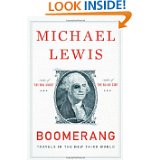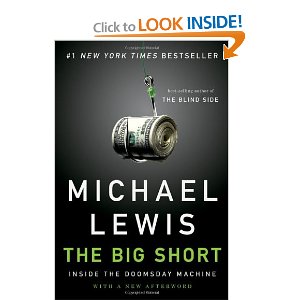Back in College, in social science classes, we learned never to rely on cultural explanations. Professors excised culturally deterministic phrases from our analysis: “The Spanish society tends to…The African American culture explains…Inevitably, Catholic norms led to… ”
Cultures change, as does our view of them, the intellectual posits, and culture drops out as a powerful explanation in the long run.
In Boomerang, Michael Lewis raises up national culture as the key lens to understanding the European Debt crisis. This makes for poor social science and weak financial insight, but like anything from Michael Lewis’ pen, wildly entertaining reading.
Lewis sets up the central conceit of Boomerang as follows: When the lights go out and nobody is looking, what do people do? In the financial context, he means specifically that when easy credit flowed into Europe between 2002 and 2007, what national character trait explains how the people of Iceland, Greece, Ireland, and Germany reacted, respectively? The first three nations blew massive holes in the balance sheets of their national banks and governments, while the Germans remained prudent, and more specifically, anal.
Icelanders, we learn, transformed themselves in one decade from risk-taking fisherman to free spending hedge funders. Easy credit from abroad allowed their testosterone-driven inner-Viking to bust loose from any prudence or fiscal constraint.
Greeks bring an every-man-is-an-island-unto-himself, as well as a deep distrust of one another, to their financial lives, resulting in a nation of tax cheats who assume all citizens cheat on their taxes. The government cannot raise revenues as a result.
The Irish moved from abnormally impoverished (in the European context) to abnormally enriched over the course of the decade. Their seemingly acquiescent round-trip back to relative poverty fits in with what Lewis describes as an unwillingness to communicate their troubles to anybody else. They nationalized their insolvent banks, needlessly in Lewis’ view, in a brutal financial move that kept their troubles deeply repressed.
Lewis saves his most memorable images for the German national character. Their coprophilia[1] apparently explains why German investors prefer a clean-seeming AAA-bond investment that contains steaming toxic subprime bonds bundled inside. Lewis hires an overeducated chauffer to drive him to the Hamburg Red Light district. She then proceeds to list a steady stream of phrases using the German scheisse in everyday German conversation. Somehow
None of this helps explain how Greece will resolve its national debt problems or whether Germany will, yet again, approve ECB loans to bail out its less thrifty southern European brethren.
Lewis’ Big Short from the previous year managed to be simultaneously entertaining and informative about toxic CDOs and the traders who loved to short them. In Boomerang, he mostly settles for entertaining cultural sketches, albeit with limited financial insight. But given that Lewis writes about financial characters for a living better than almost everybody else does what they do for a living, it’s still fun. If Europe is going to experience financial Armageddon, can’t we also laugh a little?[2]
Please see related post, my review of Michael Lewis’ Liar’s Poker.
As well as related post, my review of Michael Lewis’ The Big Short.
And Michael Lewis’ The Undoing Project
Please also see related post, All Bankers Anonymous Book Reviews in one place.
[1] You’d better go look that one up. I’ll wait right here….Ok, all set then? Great, let’s move on.
[2] This seems as good a time as any to break out the old saw: “Heaven is where the police are British, the cooks are French, the mechanics are German, the lovers are Italian and it is all organized by the Swiss. Hell is where the police are German, the cooks are English, the mechanics are French, the lovers are Swiss, and it is all organized by the Italians.”
Post read (2660) times.





